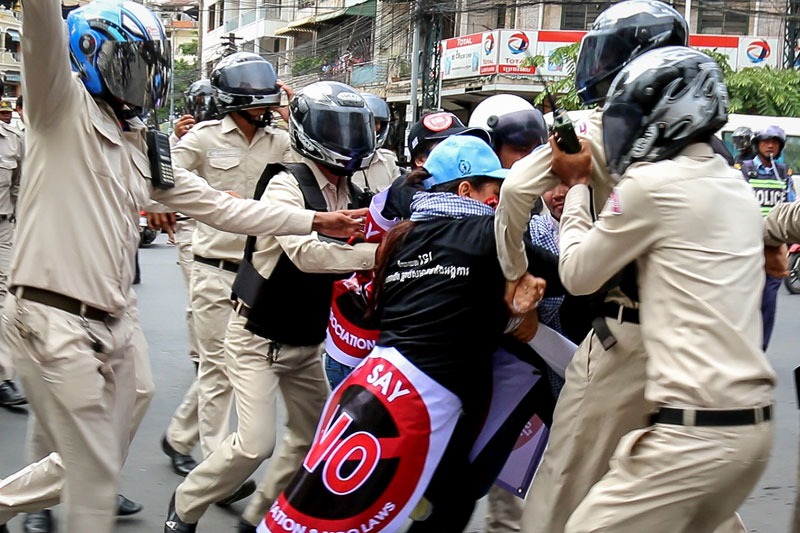Authorities in Phnom Penh arrested and released five activists on Saturday for handing out leaflets urging residents to “Say No” to a pending NGO law that critics fear will be used to muzzle critics of the ruling CPP.
The bill was approved by the National Assembly’s CPP lawmakers a week ago amid a boycott by the minority CNRP and is awaiting a vote in the Senate, which the ruling party also controls.

At about 8 a.m. on Saturday, some 50 activists started marching southwest from the Night Market on Phnom Penh’s riverside, handing out the “Say No” leaflets at other markets they hit along the way.
By about 10 a.m., they reached O’Russei market near the Olympic Stadium, where market and district security guards arrested five women among them. They were taken to the commune police office before being transferred to the district police station for further questioning and released at about 5 p.m.
“We had to arrest them because they acted without permission,” City Hall spokesman Long Dimanche said Sunday. “They did it on the street and in public places. In other countries, people offer support and congratulations when a new law is made. But here, they are against making laws.”
He added that the march “was affecting public order and causing traffic jams. It was also affecting the environment, because after people read it [the leaflet], they threw it away.”
Mr. Dimanche accused the five women, all well-known anti-eviction activists, of being “professional and all-purpose protesters.” He said they were released after signing contracts promising to stop handing out the leaflets.
Song Sreyleap, one of the arrested women, said they were asked by authorities where the leaflets had been printed but refused to tell them, and were accused of taking their marching orders from unnamed masters.
“I told them that no one ordered us to do this,” she said. “It is the will of the people to protest against a law that does not protect the interests of the people.”
Ms. Sreyleap said she signed the contract in order to secure her release, but would continue protesting against the NGO law.
Am Sam Ath, technical supervisor for rights group Licadho, said he had been monitoring the march and witnessed the arrests.
“Every day, we see schools, companies, clinics and restaurants handing out leaflets on the street, but we never see authorities stop or arrest them,” he said.
The Law on Associations and Non-Governmental Organizations would require all non-government groups in the country, save the smallest community organizations, to register with the state and file annual reports on their activities and finances.
The government says the country needs the law to combat money laundering and terrorism. Critics dismiss the argument as a red herring, and fear the government will use vague provisions on maintaining political neutrality and respecting national traditions to shut down groups that criticize the CPP.
The U.N., U.S. and European Union have all urged the CPP to reconsider the legislation.



